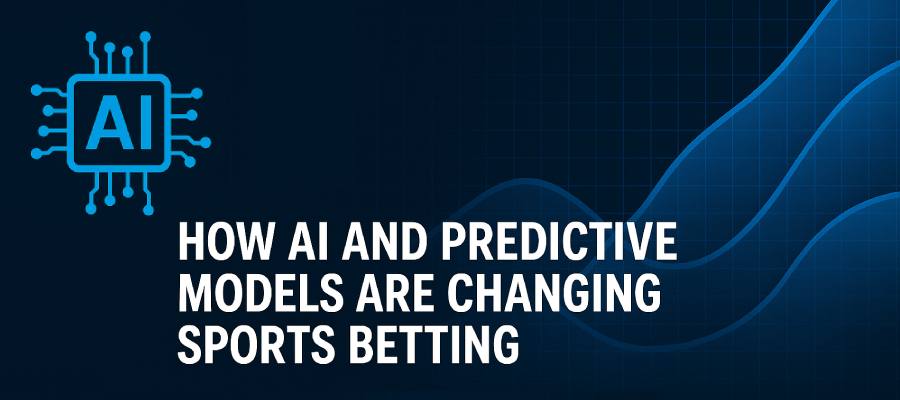AI and predictive models are transforming how bettors approach modern sports wagering.
What once relied on instinct, trends, and gut feel has shifted toward data-heavy precision. The rise of AI for sports betting tools has created a landscape where bettors can identify value faster, react to information quicker, and interpret markets more accurately.
MyBookie’s online sportsbook integrates data-driven insights directly into the betting experience, helping users take advantage of this new digital edge.
Table of Contents
- AI Sports Betting Edge: Quick Snapshot
- AI in Sports Betting – The Big Picture
- Predictive Analytics in Sports Betting
- Live Betting Adjustment Engines
- How to Use AI for Sports Betting
- AI Sports Betting Prediction Models in Action
- The AI Revolution in Sports Betting – What’s Next
- AI in Sports Betting – Quick Infograph Guide
- Final Thoughts
- Featured Sports Betting Guides | Learn, Analyze & Win
AI Sports Betting Edge: Quick Snapshot
AI models turn massive data into clear betting signals – from player performance projections to live in-game adjustments.
What AI can help you do:
• Spot mispriced lines faster
• React instantly to injuries & lineup changes
• Track live momentum in real time
Blend AI insights with smart bankroll management for sustainable long-term success.
AI in Sports Betting – The Big Picture
Artificial intelligence processes millions of data points in real time, giving bettors tools that traditional handicapping simply can’t match for speed or scope.
These systems work without emotion or bias, generating clearer, more stable projections than most purely manual approaches.
Key advantages of AI in sports betting include:
- The ability to scan matchup history, pace trends, rotations, and weather at once.
- Automated AI sports betting predictions that update with every new piece of information.
- Smarter line analysis for sharper sports betting with AI strategies.
- Continuous monitoring of online sportsbook markets for value shifts and mispriced lines.
Used correctly, AI becomes a decision-support layer that improves how you interpret odds rather than a replacement for personal judgment.
↑ TopPredictive Analytics in Sports Betting
Predictive analytics sits at the core of modern sports betting prediction.
These models forecast outcomes using large sets of historical stats, efficiency metrics, and game context.
Rather than guessing from trends, you’re working with probabilities grounded in data.
Main types of predictive engines include:
- Regression models for trendline-based projections and totals.
- Neural networks for complex pattern recognition across multiple variables.
- Ensemble models that blend approaches and reduce error in AI bets prediction.
Each model type has strengths. Many advanced AI betting systems combine them to minimize blind spots.
Player Performance Models
Player-focused AI engines calculate expected output for individual athletes using factors like:
- Matchup efficiency and defensive schemes
- Usage rate and role in the offense
- Fatigue and travel schedule
- Coaching adjustments and rotation changes
This gives bettors clearer edges on props and fantasy-driven markets through advanced AI betting analysis and stronger AI sports betting prediction models.
Game Outcome Simulations
Monte Carlo simulations generate thousands of alternate game scenarios to estimate win probabilities and totals distributions.
They adjust for:
- Weather and pace
- Key injuries and rest
- Home-field influence
- Matchup-driven game plans
This simulation-based form of AI sports betting predictions helps reveal hidden value before the market shifts.
Examples of AI Model Types in Action
| Model Type | Primary Use | Example Edge |
|---|---|---|
| Regression | Totals & spread projections | Projects scoring based on pace & efficiency |
| Neural Network | Pattern recognition | Finds non-obvious matchup advantages |
| Ensemble | Error reduction | Blends predictions to stabilize outputs |
| Simulation Engine | Win probability & ranges | Runs thousands of game outcomes for true odds |
Table: Core predictive engines behind modern AI sports betting tools.
↑ TopLive Betting Adjustment Engines
AI now dominates live betting, where lines update second by second.
Real-time adjustment engines analyze:
- Momentum shifts and scoring runs
- Possession quality and shot selection
- Clock and timeout patterns
- Fatigue indicators and pace changes
Because lines move instantly, using AI for sports betting during live play offers one of the clearest edges for sharp bettors who can react faster than the average player.
Injury and Lineup Impact Analysis
AI also quantifies the true effect of lineup changes, providing insight into:
- Star-player absences and replacements
- Rotational role increases for bench players
- Defensive matchup shifts and cross-matches
- Replacement-level production versus starter-level output
Sharp bettors use this knowledge to avoid market overreactions and spot props or sides where the line hasn’t fully adjusted.
↑ TopHow to Use AI for Sports Betting
Bettors now have multiple paths to AI-powered insights.
The best approach is blending machine predictions with personal research, as even the best sports betting guide emphasizes judgment, discipline, and bankroll control.
Useful categories of tools include:
- Free public models offering simple projections ideal for a beginner’s guide to sports betting.
- Paid prediction services providing deeper breakdowns, alerts, and advanced sports betting tips.
- MyBookie’s integrated insights offering matchup modeling and line-movement tracking within your online betting experience.
- Custom-built models for bettors learning how to use AI for sports betting through hands-on development.
Each has strengths and limitations. The key is not blind following, but using AI as a decision-support layer that improves your reads.
Can AI Predict Sports Betting Outcomes?
AI pinpoints edges, not certainties.
Even elite predictive analytics in sports betting models aim for long-term win rates around 55–60 percent. Variance still dominates the short term due to unpredictable human factors, officiating swings, or simply bad luck.
Still, the answer to “can AI help with sports betting?” is yes. Used strategically, it:
- Improves line evaluation and closing line value
- Identifies mispriced props and totals
- Highlights inefficiencies before the market corrects
This makes using AI for sports betting a sustainable long-term approach rather than a one-game shortcut.
↑ TopAI Sports Betting Prediction Models in Action
Real-world examples show how these systems deliver profitable opportunities:
- An AI model flags a football +7 underdog covering in 68% of simulations, revealing value against the spread.
- A player-prop engine hits 61% on basketball scoring overs during high-pace matchups.
- Live AI catches a momentum shift at halftime and triggers an alert before lines adjust.
- An injury-impact model beats the closing line 72% of the time after recalculating player usage.
- A soccer draw model identifies value in low-scoring leagues where bookmakers often misprice the outcome.
These snapshots illustrate why AI and sports betting tools continue to shape sharper strategies across markets.
What Drives AI Edges in Real Markets?
| Driver | Why It Matters | Example |
|---|---|---|
| Data Volume | Captures more variables than manual capping | Combining pace, efficiency, travel, & officiating trends |
| Speed | Reacts faster than human bettors | Updating live lines after injuries or ejections |
| Consistency | No tilt, fatigue, or emotional bias | Sticking to edge-based bets even after a bad beat |
| Pattern Detection | Finds edges humans miss | Identifying niche markets with consistent mispricing |
Which Sports Benefit Most from AI & Predictive Models?
Not all sports benefit from AI in the same way.
Some leagues generate richer data, more predictable patterns, and cleaner statistical environments—making them ideal for advanced predictive models.
Here are the sports where AI delivers the biggest betting edge:
- Football (NFL & College Football)
Massive data volume, well-defined roles, and slow game pace make football perfect for simulations, injury-impact models, and matchup analytics. - Basketball (NBA & International)
Pace, efficiency metrics, player usage, and possession-based stats give AI engines powerful accuracy for player props, totals, and momentum-driven live betting. - Soccer
Low-scoring variance combined with global tracking data helps AI identify value in draws, totals, and matchup-specific markets. - Baseball (MLB)
One of the most statistically friendly sports. AI thrives on pitcher-vs-batter matchups, win probabilities, and daily variance forecasting. - Hockey (NHL)
AI models map out pace of play, shot-quality metrics, regression candidates, and expected goals (xG)-based edges. - Tennis
Individual performance models and momentum-analysis engines allow bettors to catch live shifts more accurately during matches.
The bottom line: Sports with strong data consistency and repeatable patterns give AI the biggest predictive power.
As datasets grow, AI-supported betting becomes even more effective across every major market.
↑ TopThe AI Revolution in Sports Betting – What’s Next
The next wave of AI innovations will deepen accuracy, context, and transparency.
Developments on the horizon include:
- Computer vision models measuring micro-movements, shot quality, and physical fatigue straight from video.
- Sentiment analysis across millions of social posts, uncovering motivation, locker-room hints, or early lineup leaks.
- Blockchain-verified transparency for advanced AI sports betting news, audit trails, and model integrity.
MyBookie is already exploring systems that put users at the front of this AI revolution in sports betting, offering new insights as markets evolve.
AI in Sports Betting – Quick Infograph Guide
How AI Powers Smarter Sports Betting
AI models turn overwhelming sports data into clear, actionable betting signals. Use this framework to understand where the edge comes from.
- Box scores & advanced stats
- Injury reports & rotations
- Weather, travel & schedule spots
- Regression & neural nets
- Monte Carlo simulations
- Ensemble blends for stability
- Compare true odds vs line
- Track line movement & steam
- Highlight mispriced markets
- Edge-based stake sizing
- Avoid emotional overreactions
- Review results & refine models
Use AI as a support system: let the models scan the data while you manage risk, discipline, and final bet selection.
Final Thoughts
AI has become one of the most powerful equalizers available to bettors today.
When used correctly, it turns overwhelming data into clear, actionable signals.
Whether you’re reading a sports betting guide for the first time or refining your advanced strategy, AI helps you bet smarter, not harder.
Used with discipline, AI improves line evaluation, identifies value before markets adjust, and enhances long-term profitability.
The key is blending machine-driven insights with human judgment, not replacing one with the other.
Explore MyBookie’s AI-informed tools, test different systems, and step confidently into the future of profitable, data-supported wagering.
Bet Smarter with AI-Backed Insights at MyBookie
Ready to put data to work? Combine AI-powered analysis with MyBookie’s live odds, props, and futures across every major sport.
Start Betting with AI SupportTrack line movement, compare odds, and build a sharper strategy with MyBookie Sportsbook.
Featured Sports Betting Guides | Learn, Analyze & Win
Take your strategy to the next level with MyBookie’s complete sports betting guide library. Learn how to evaluate odds, manage risk, and combine AI insights with sharp fundamentals.
- Can You Make Money Sports Betting?
- An Intro to Sports Betting: Spread Betting Tips
- Sports Betting Guide: Spread vs Money Line
- Wagering on Moneyline or Straight Up Bets
- The Use of Trends in Football Betting
- Using Trends to Predict Outcomes in Sports Betting
- Half-Bankroll Betting Strategy
- Introduction To Bankroll-Boosting Pleaser Bets
- Principles of Value Betting
Ready to apply what you’ve learned?
Browse Live Sports Betting Lines
MyBookie Odds, Props & Futures Across Every Sport
Ready to put AI insights into action?
Bet Sports at MyBookie
Live odds, props, and AI-friendly markets
Sports Betting Odds
Explore everything You need to know about MyBookie Rules and Sportsbook Rules
Betting Online Casino
| Playing Blackjack or Poker |
| Understanding Live Casino |
| Best Casino Online Games |
- How FIFA World Cup Betting Works (From Group Stage to Final)
- UFC Fight Night Betting Odds Explained: How to Read the Lines Before Fight Night
- UFL Betting Guide: Off-Season Strategy & Championship Futures Picks
- What is the Monthly Income Sports Betting System?
- Best Bets for March Madness Beginners (And What to Avoid)






